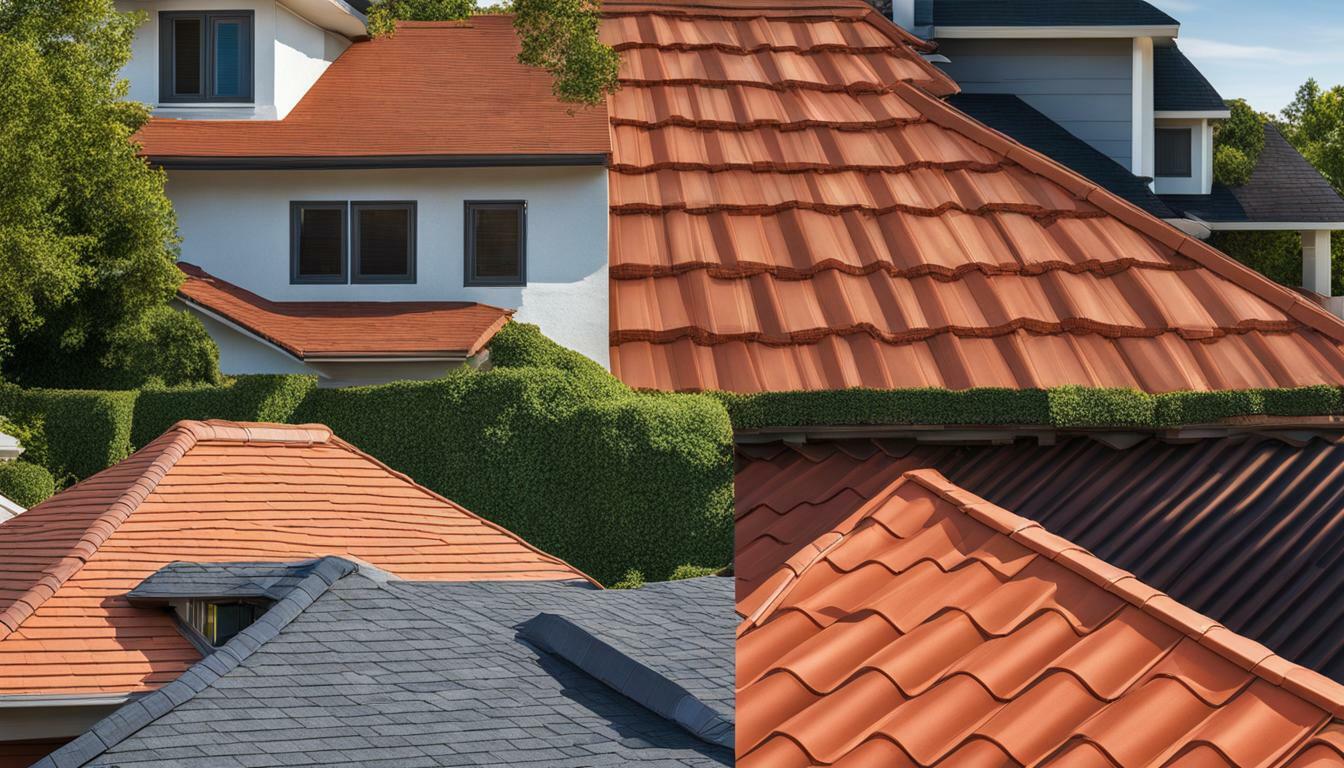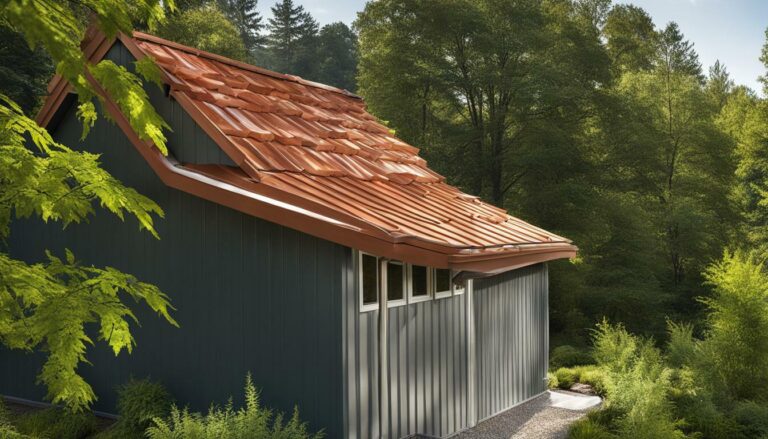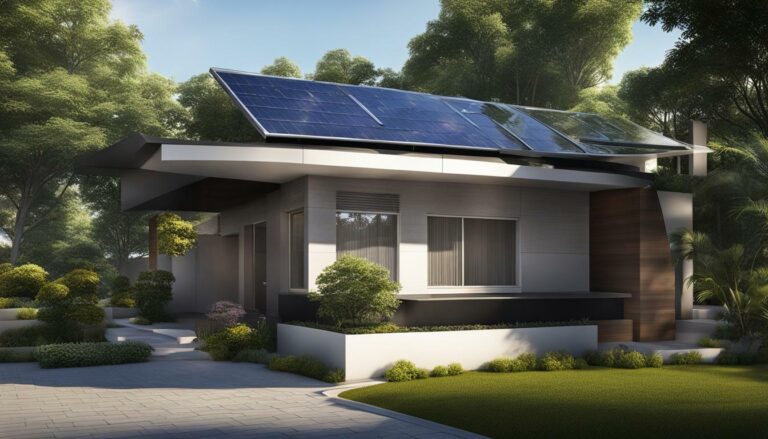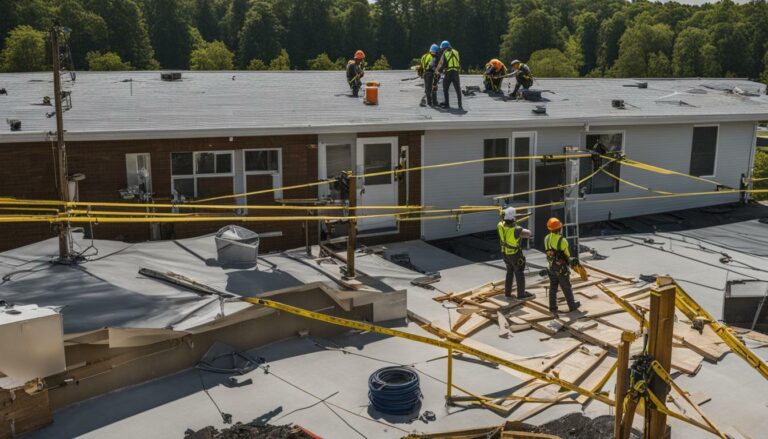Understanding the Difference between Roof Repair and Replacement
When it comes to addressing issues with your roof, it’s essential to understand the difference between roof repair and roof replacement. While both options aim to fix problems with your roof, they differ significantly in terms of scope and cost.
Roof repair is a temporary solution that focuses on fixing isolated damage. It involves identifying and addressing specific issues such as leaks, missing shingles, or damaged flashing. Repairing your roof can be a cost-effective option when the damage is limited to a small area or section.
On the other hand, roof replacement involves removing the entire roofing system and installing a new one. This option is necessary when the damage is extensive or when your roof has reached the end of its lifespan. It provides a long-term solution, ensuring the structural integrity and functionality of your roof.
- Roof repair is a temporary solution for isolated damage, while roof replacement involves installing a new roofing system.
- The age of your roof and the extent of the damage are important factors in deciding whether to repair or replace it.
- Consider the type of roof, urgency of repairs, long-term plans, budget constraints, energy efficiency, and building codes when making a decision.
- Roof repair can be cost-effective for small-scale damage, while roof replacement is necessary for extensive damage or an aging roof.
- Consulting with a roofing professional is crucial to assess the condition of your roof and determine the best course of action.
Signs You Need Roof Repair or Replacement
There are several signs you should look out for to determine whether your roof needs repair or replacement. Recognizing these signs early on can help you prevent further damage and avoid costly repairs down the line.
1. Leaks and Water Damage: If you notice water stains on your ceiling or walls, it could indicate a leak in your roof. Leaks are a clear sign that your roof needs attention, and depending on the severity, it may require either repair or replacement.
2. Missing or Damaged Shingles: Inspect your roof regularly for any missing, cracked, or curling shingles. These issues can compromise the integrity of your roof, leading to leaks and water damage. In some cases, replacing individual shingles may suffice, but extensive damage may require a full roof replacement.
3. Sagging or Uneven Roof: A sagging or uneven roof is a serious structural issue that should not be ignored. It could indicate underlying damage or structural issues, and immediate action is necessary. Professional inspection is crucial to determine whether repair or replacement is the appropriate solution.
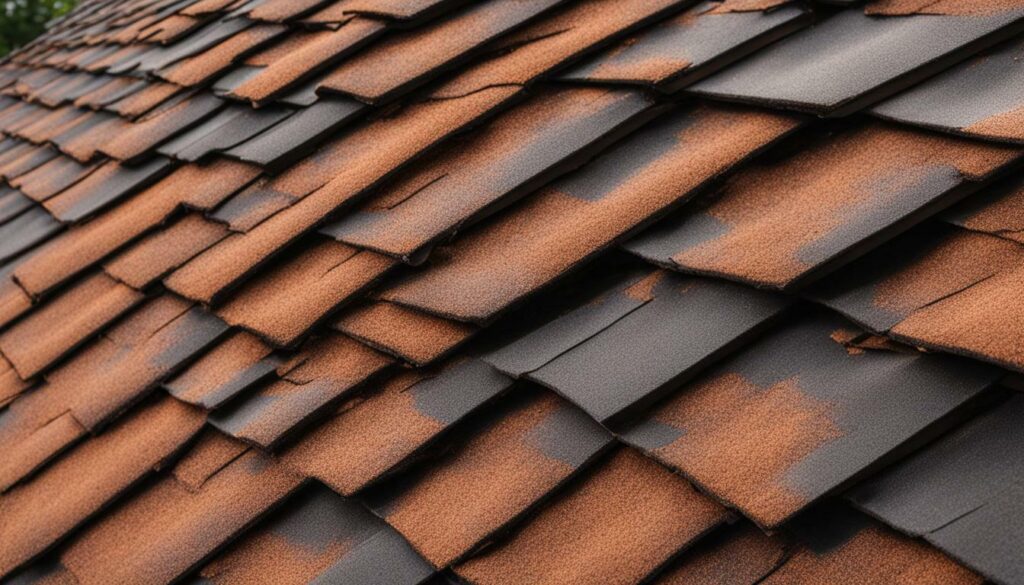
Schedule regular roof inspections
“Regular inspections can help identify potential problems early on, allowing you to address them before they escalate.”
4. Increased Energy Bills: If your energy bills have significantly increased, it could be a sign of poor insulation or ventilation in your roof. Upgrading your roof’s energy efficiency through repairs or replacement can save you money in the long run.
5. Age of Your Roof: The age of your roof is an important factor in determining whether it needs repair or replacement. Most roofs have a lifespan of 20-25 years, so if your roof is nearing or past its expected lifespan, replacement may be the more practical solution.
Remember, these signs are not exhaustive, and a professional roof inspection is essential to accurately assess the condition of your roof. Consulting with a roofing specialist will help you make an informed decision on whether to opt for repair or replacement.
Factors to Consider when Deciding between Roof Repair or Replacement.
Before making a decision, it’s important to consider several factors that can help guide you towards the best option for your roof.
Firstly, the age of the roof is a crucial factor. As roofs age, they become more susceptible to damage, and simply repairing the roof may not effectively prolong its lifespan. In such cases, it might be more cost-effective and practical to opt for a complete replacement.
The extent of the damage also plays a significant role in the decision-making process. If the damage is limited to a small area or section of the roof, repair can be a viable solution. However, if the damage is extensive and affects the overall integrity of the roof, a repair may end up being almost as costly as a replacement.
Additionally, the type of roof you have should be considered. Certain roofing materials, like slate, can be repaired individually, while others may require a full replacement, even if only specific components are damaged.
Other factors to keep in mind include urgency, long-term plans and budget, energy efficiency, and building codes. If a major storm is looming, immediate repair might be necessary to prevent further damage. If you plan to sell your home in the future, a new roof can significantly enhance its value. Budget constraints may sway you towards repair, as it is generally less expensive than a complete replacement. Energy efficiency is worth considering, as newer roofing materials can provide savings in energy costs. Lastly, building codes in your area may dictate whether a third layer of shingles is permitted, which can influence your decision.
To summarize, the decision between roof repair and replacement should be based on a thorough inspection by a roofing professional, considering factors such as the age and condition of the roof, extent of damage, long-term plans and budget, energy efficiency, and building codes. By carefully weighing these factors, you can make an informed decision that provides the best solution for your specific roof.
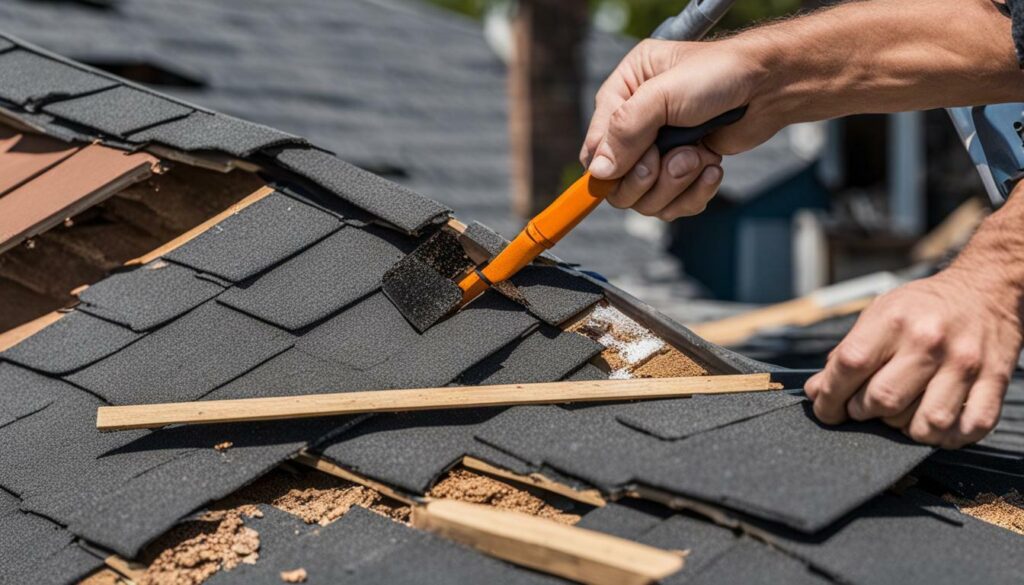
| Factors to Consider | Roof Repair | Roof Replacement |
|---|---|---|
| Age of the Roof | Repair may not extend the lifespan | New roof provides longer lifespan |
| Extent of Damage | Cost-effective for small areas | Necessary for extensive damage |
| Type of Roof | Repair individual components | Possible full replacement even for partial damage |
| Urgency | Immediate repair to prevent further damage | Replacement may be time-sensitive |
| Long-Term Plans & Budget | Less expensive than replacement | Enhances property value, long-term investment |
| Energy Efficiency | No significant impact | New materials offer energy savings |
| Building Codes | No limitations | May restrict re-roofing options |
Pros and Cons of Roof Repair versus Replacement
Each option has its pros and cons, and understanding them will help you make an informed decision about your roof.
When it comes to roof repair, one of the main advantages is cost-effectiveness. Repairing isolated damage can be significantly cheaper than replacing the entire roof. Additionally, repairs can be completed quickly, minimizing disruption to your daily life.
However, there are some drawbacks to consider. Roof repair is typically a temporary solution that may not address underlying issues. If your roof is aging or has extensive damage, repeated repairs may become necessary, ultimately costing you more in the long run. Additionally, repaired areas may not match the rest of the roof aesthetically.
If you opt for roof replacement, you can enjoy several benefits. One of the biggest advantages is increased durability and lifespan. A new roof can provide better protection against leaks, storm damage, and other issues. It can also enhance the curb appeal and value of your home if you plan to sell in the future.
However, roof replacement does come with its downsides. It is a more costly and time-consuming process compared to repair. The installation process may disrupt your daily life, and you will need to choose from a wide range of roofing materials and styles, which can be overwhelming.
| Pros of Roof Repair | Cons of Roof Repair |
|---|---|
| Cost-effective | May not address underlying issues |
| Quick completion | Repeated repairs may become necessary |
| Repairs may not match the rest of the roof aesthetically |
| Pros of Roof Replacement | Cons of Roof Replacement |
|---|---|
| Increased durability and lifespan | More costly and time-consuming |
| Enhances curb appeal and home value | Potential disruption to daily life during installation |
| Wide range of materials and styles to choose from |
Ultimately, the decision between roof repair and replacement depends on several factors, including the age and condition of the roof, the extent of the damage, your long-term plans, budget, and energy efficiency considerations. Consulting with a roofing professional can provide valuable insights and help you make the right choice for your specific situation.
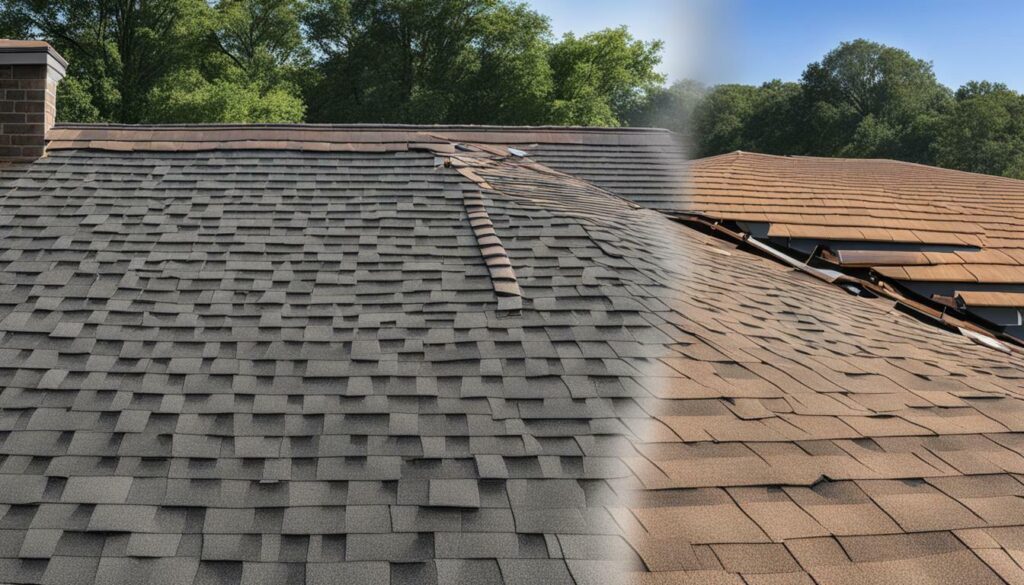
Prioritize regular roof maintenance to prolong its lifespan and minimize the need for extensive repairs or replacements. Regular inspections and timely repairs can help catch potential issues early on and save you money in the long run.
When to Choose Roof Repair over Replacement
In certain scenarios, roof repair can be a viable choice that effectively addresses specific issues without the need for a full replacement. It’s important to consider the following factors when deciding whether to opt for roof repair:
- Isolated Damage: If the damage to your roof is limited to a small area or section, repair may be a more cost-effective solution than a full replacement.
- Budget Constraints: If you’re working within a tight budget, repairing the damaged areas of your roof may be a more affordable option compared to a complete replacement.
- Age of the Roof: If your roof is relatively new and in overall good condition, repairing specific issues can help prolong its lifespan.
- Urgency: If your roof has suffered damage due to a recent storm or severe weather conditions, repairing it quickly can prevent further damage and protect your home.
It’s important to note that while roof repair can be a suitable choice in certain situations, there are also instances where full roof replacement is necessary. An assessment by a roofing professional will help determine the best course of action based on the specific condition of your roof.

To make an informed decision between roof repair and replacement, it’s crucial to consider various factors such as the extent of the damage, long-term plans for your property, energy efficiency, building codes, and the type of roof. These considerations will help determine the most appropriate solution for your specific needs.
| Factors to Consider | Roof Repair | Roof Replacement |
|---|---|---|
| Extent of Damage | Focused on specific areas | Entire roofing system |
| Long-Term Plans | May be sufficient | Enhances property value |
| Energy Efficiency | Depends on existing materials | Potential for energy savings |
By carefully weighing these factors and seeking professional advice, you can confidently decide whether to choose roof repair or replacement, ensuring the optimal solution for your roof’s condition and your personal circumstances.
Benefits of Roof Repair versus Replacement
Choosing roof repair can offer several advantages that make it an attractive option for homeowners. One of the key benefits is cost-effectiveness. Repairing a roof is generally less expensive than a full replacement, especially when the damage is isolated to a small area. This can help homeowners save money while still addressing the immediate roofing issues.
Another advantage of roof repair is that it can extend the life of your existing roof. By fixing isolated damage and addressing minor issues, you can prevent further deterioration and potentially delay the need for a full replacement. Regular maintenance and timely repairs can help prolong the lifespan of your roof and ensure its continued functionality.
Flexibility is also a benefit of roof repair. Depending on the type of roof and the extent of the damage, repairs can be tailored to suit the specific needs. Individual components can be replaced or repaired, minimizing disruption and costs. This flexibility allows homeowners to address the damage without having to replace the entire roofing system.
| Benefits of Roof Repair | Benefits of Roof Replacement |
|---|---|
|
|
“Roof repair is a cost-effective solution that can extend the life of your existing roof while addressing isolated damage.” – Roofing Professional
It is important to note that roof repair may not be suitable for all situations. Extensive damage, an aging roof, or long-term plans to sell the home may require a full replacement. Additionally, energy efficiency is a consideration when deciding between repair and replacement. Newer roofing materials can offer improved energy efficiency, potentially reducing energy costs over time.
Ultimately, the decision between roof repair and replacement should be based on a thorough inspection by a roofing professional and consideration of various factors such as the age and condition of the roof, the extent of the damage, long-term plans, budget, building codes, and energy efficiency. By weighing these factors, homeowners can make an informed decision that best meets their specific needs and goals.
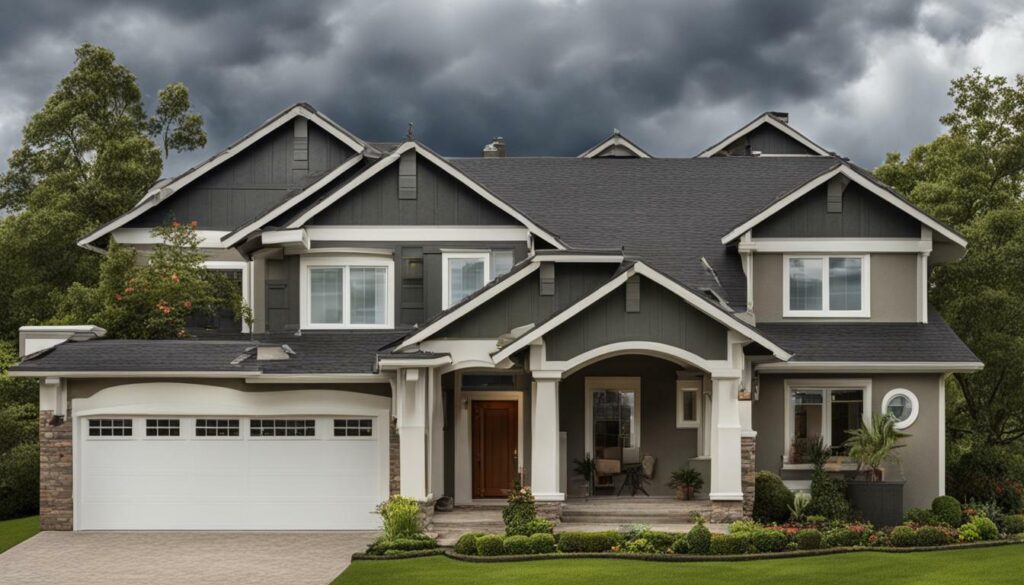
In summary, roof repair offers several advantages compared to a full replacement. It is a cost-effective solution for isolated damage, extends the life of the existing roof, and provides flexibility to address specific issues. However, it may not be suitable for extensive damage or an aging roof. Consider factors such as long-term plans, budget, building codes, and energy efficiency when making the decision. Consulting with a roofing professional is important to assess the condition of the roof and determine the most appropriate course of action.
Source:
Roofing Professional: A roofing professional with over 20 years of experience in the industry.
Cost Difference between Roof Repair and Replacement
Understanding the cost implications of roof repair and replacement can help you plan your budget accordingly. The decision to repair or replace your roof can have significant financial implications, so it’s important to weigh the costs and benefits.
In general, roof repairs tend to be less expensive than full replacements. The cost of repairs will depend on the extent of the damage and the materials needed. For minor repairs, such as fixing a few shingles or patching a small area, the costs can be relatively low. However, if the damage is extensive or requires replacing larger sections of the roof, the costs can increase.
On the other hand, roof replacements involve a larger investment upfront but can provide long-term savings. While the initial cost of a replacement may be higher, a new roof can last for several decades, reducing the need for frequent repairs. Additionally, newer roofing materials can be more energy-efficient, resulting in lower energy bills over time.
| Roof Repair | Roof Replacement |
|---|---|
| Lower upfront cost | Higher upfront cost |
| Short-term solution | Long-term investment |
| Cost varies based on extent of damage | Cost varies based on size and materials |
| Potential for future repairs | Reduced need for future repairs |
| Minimal disruption to daily life | Disruption during installation process |
Ultimately, the cost difference between roof repair and replacement will depend on the specific circumstances of your roof. It’s important to consult with a professional roofing contractor to assess the condition of your roof and provide an accurate estimate of the costs involved.
By understanding the cost implications and considering factors such as the age of the roof, extent of damage, long-term plans, and energy efficiency, you can make an informed decision that aligns with your budget and goals.
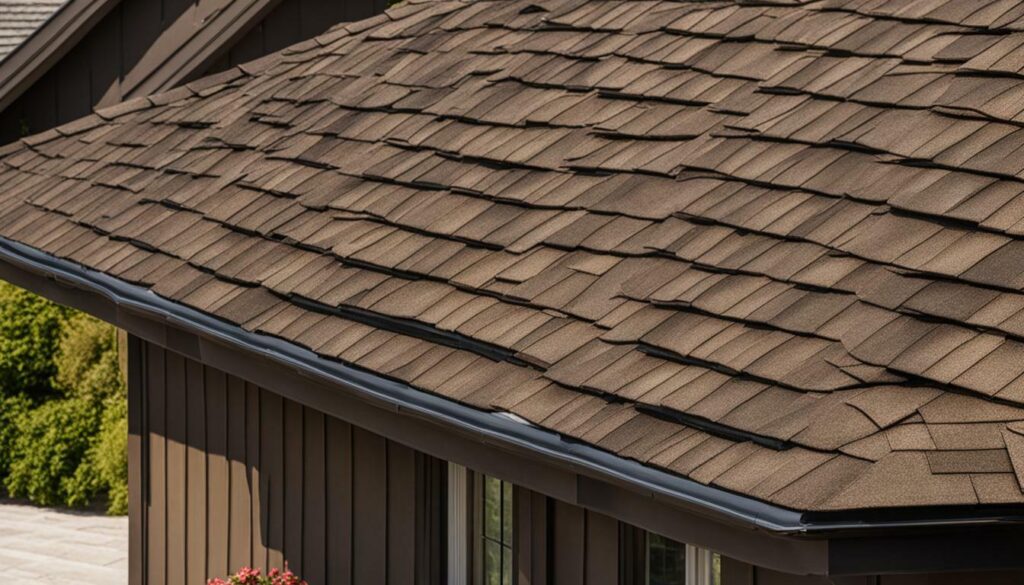
When deciding between roof repair and replacement, it’s important to consider any warranties or insurance coverage you may have. Some warranties may only cover repairs, while others may provide coverage for a full replacement under certain circumstances. Reviewing these details can help inform your decision-making process.
Furthermore, building codes and regulations may also impact your options. It’s essential to ensure that any repairs or replacements comply with local building codes to avoid potential issues down the line.
Lastly, when comparing costs, be sure to take into account the long-term benefits of a roof replacement. While the initial investment may be higher, a new roof can increase the value of your home, improve energy efficiency, and provide peace of mind knowing that you have a durable and reliable roofing system.
Tips for Choosing Roof Repair or Replacement
Here are some helpful tips to guide you in selecting the right option for your roof:
1. Assess the extent of the damage: Before making a decision, thoroughly inspect your roof to determine the extent of the damage. If the damage is limited to a small area or section, roof repair may be a suitable and cost-effective solution. However, if the damage is extensive and affects multiple areas, a roof replacement might be necessary.
2. Consider the age of your roof: The age of your roof is an important factor to consider. If your roof is relatively new and the damage is isolated, repairing it can extend its lifespan. However, if your roof is nearing the end of its lifespan and experiencing multiple issues, replacement may be the better long-term solution.
3. Consult with a roofing professional: It’s always advisable to seek the expertise of a roofing professional. They can provide a comprehensive assessment of your roof’s condition and offer expert advice on whether repair or replacement is the most suitable option. Their knowledge and experience will help you make an informed decision.
4. Evaluate your long-term plans and budget: Consider your long-term plans for your property. If you plan to sell your home in the future, a new roof can increase its value and appeal to potential buyers. Additionally, take your budget into account. While repairs are generally less expensive upfront, a replacement may provide long-term cost savings by eliminating the need for frequent repairs.
To summarize, when choosing between roof repair and replacement, assess the extent of the damage, consider the age of your roof, consult with a professional, and evaluate your long-term plans and budget. By taking these factors into consideration, you can make an informed decision that ensures the longevity and functionality of your roof.
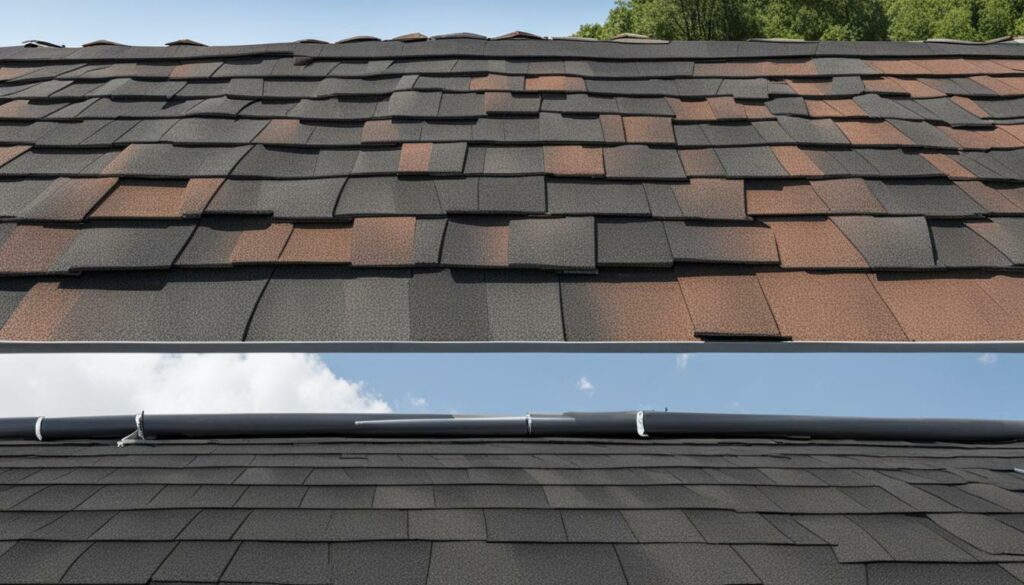
Energy efficiency is a crucial aspect to consider when deciding between roof repair and replacement. Upgrading your roofing system to one that is more energy-efficient can have long-term benefits for both the environment and your wallet. With advancements in technology, there are now various energy-efficient roofing materials available that can help regulate temperature, reduce energy consumption, and lower utility costs.
One popular option for energy-efficient roofing is reflective or cool roofs. These roofs are designed to reflect more sunlight, reducing heat absorption and keeping the building cooler. By minimizing the transfer of heat into your home, you can rely less on air conditioning, resulting in potential energy savings. Cool roofs often have lighter colors or special coatings that enhance their reflective properties.
Another energy-efficient roofing material to consider is solar roofing. Solar panels integrated into the roof can harness the sun’s energy, converting it into electricity for your home. This alternative energy source not only reduces your reliance on traditional power grids but can also generate electricity to offset your energy consumption. Over time, solar roofing can potentially lead to significant savings on your energy bills.
| Roofing Material | Energy Efficiency Rating |
|---|---|
| Cool Roofs | High |
| Solar Roofing | Excellent |
“Investing in an energy-efficient roofing system not only benefits your home but also contributes to a greener future.”
Additionally, some energy-efficient roofing materials are made from recycled or sustainable materials, reducing the environmental impact of your roof. Materials like metal, clay tiles, and certain types of shingles are known for their durability, longevity, and eco-friendly properties. These materials can help reduce the amount of waste sent to landfills and contribute to the overall sustainability of your home.
Considering energy efficiency when deciding between roof repair and replacement allows you to make an environmentally conscious choice while potentially saving on energy costs in the long run. By consulting with a roofing professional and exploring the various energy-efficient options available, you can make an informed decision that aligns with your goals for sustainability and energy conservation.
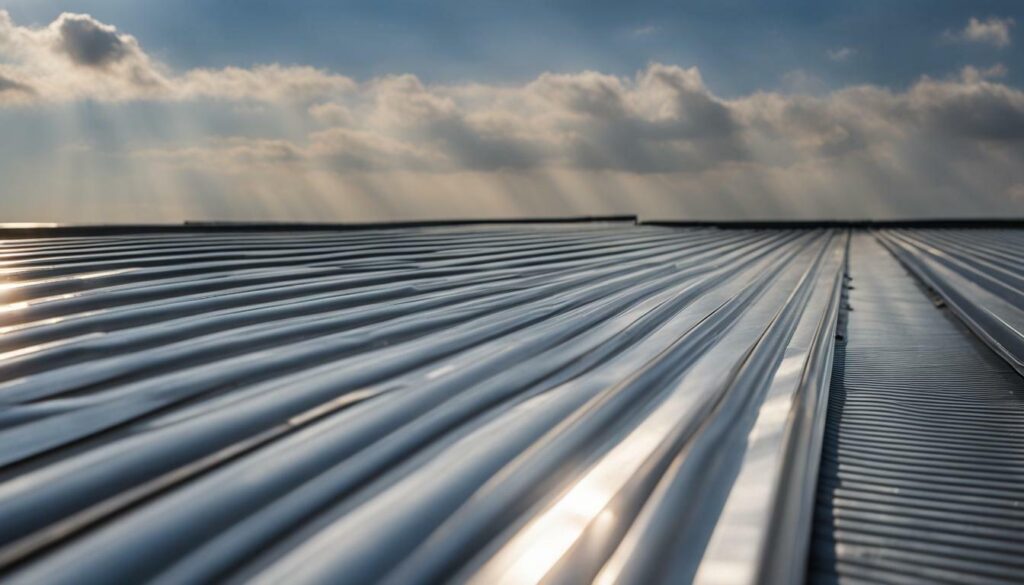
In conclusion, understanding the differences between roof repair and replacement is essential in making the right decision for your home’s roofing needs. Roof repair offers a temporary solution that focuses on fixing isolated damage, while roof replacement involves removing the entire roofing system and installing a new one.
Several factors should be taken into account when deciding between repair and replacement. The age of the roof plays a significant role, as older roofs may be more prone to further damage and may not benefit significantly from repairs. The extent of the damage is also important, as minor repairs can be cost-effective while extensive damage may require a full replacement to ensure the long-term integrity of the roof.
The type of roof is another factor to consider. While some roofs can be repaired individually, others may require a complete replacement even for minor damage to certain components. Additionally, urgency, long-term plans, budget, building codes, and energy efficiency should also be considered when making the decision.
Ultimately, it is crucial to consult with a professional roofing contractor who can assess the condition of your roof and provide expert advice. They will consider all the relevant factors and help you determine whether repair or replacement is the best option for your specific situation.
Remember, making an informed decision today can save you from further costly repairs or even potential structural damage in the future. So, don’t hesitate to seek professional guidance and ensure the longevity and performance of your home’s roof.
FAQ
Q: What is the difference between roof repair and replacement?
A: Roof repair involves fixing isolated damage on a roof, while roof replacement involves removing the entire roofing system and installing a new one.
Q: How do I know if I need roof repair or replacement?
A: The decision depends on factors such as the age and condition of the roof, the extent of the damage, long-term plans, budget, building codes, and energy efficiency.
Q: What are some signs that indicate I need roof repair or replacement?
A: Signs that you may need roof repair or replacement include leaks, damaged shingles, sagging roof, water stains on ceilings, and excessive granule loss.
Q: When should I choose roof repair over replacement?
A: Roof repair is a suitable solution when the damage is limited to a small area or section of the roof, and the rest of the roof is in good condition.
Q: What are the benefits of roof repair versus replacement?
A: The benefits of roof repair include cost-effectiveness, preservation of the existing roof structure, and avoiding the disruption of a full roof replacement.
Q: What is the cost difference between roof repair and replacement?
A: Roof repairs are generally less expensive than replacements. The cost of repair depends on the extent of the damage, while replacement involves the cost of new materials and labor.
Q: How can I choose between roof repair and replacement?
A: It is recommended to consult with a roofing professional who can conduct a thorough inspection and provide expert advice based on the specific factors and conditions of your roof.
Q: What role does energy efficiency play in roofing?
A: Energy-efficient roofing materials can provide savings in energy costs and contribute to a more environmentally friendly and sustainable home.
